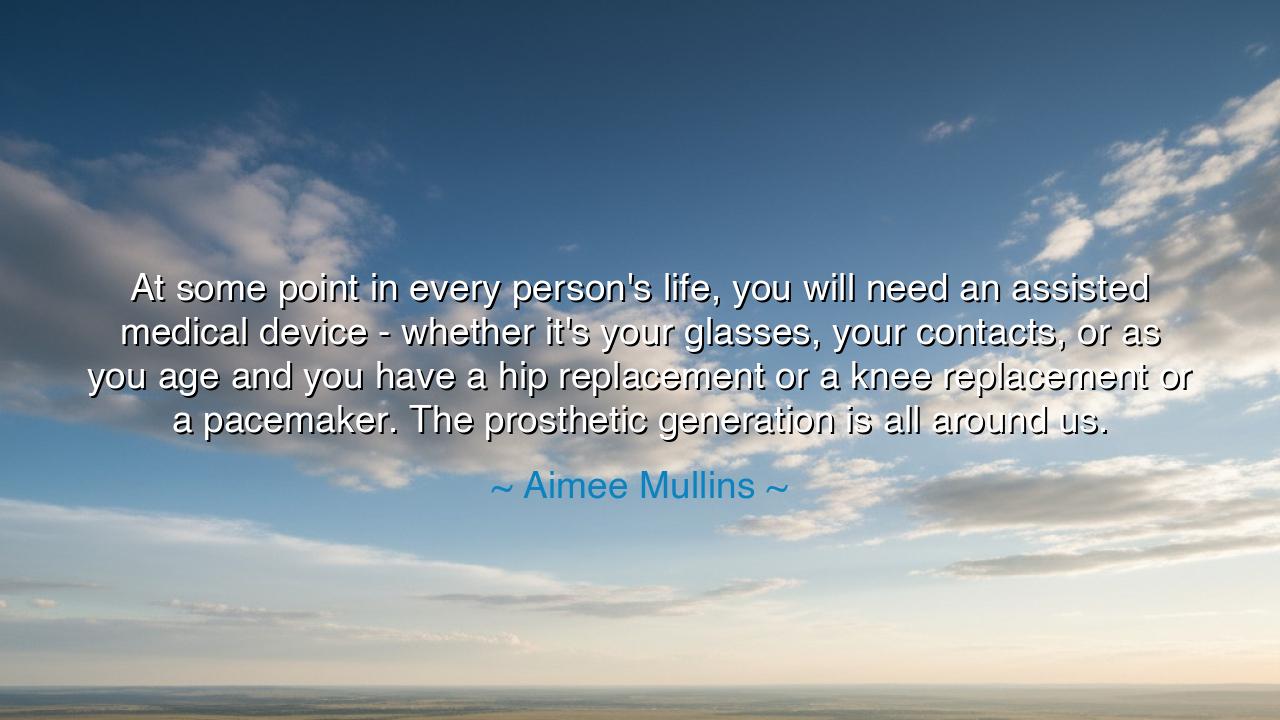
At some point in every person's life, you will need an assisted
At some point in every person's life, you will need an assisted medical device - whether it's your glasses, your contacts, or as you age and you have a hip replacement or a knee replacement or a pacemaker. The prosthetic generation is all around us.






"At some point in every person's life, you will need an assisted medical device — whether it's your glasses, your contacts, or as you age and you have a hip replacement or a knee replacement or a pacemaker. The prosthetic generation is all around us." — Aimee Mullins
Hear now the voice of Aimee Mullins, an athlete, model, and visionary, who speaks not only of technology but of human resilience. Her words, gentle yet profound, unveil a truth that humbles the pride of the flesh and exalts the spirit of invention. When she says, “The prosthetic generation is all around us,” she does not merely speak of mechanical limbs or medical tools — she speaks of the interdependence between humanity and creation, the eternal partnership between the frailty of the body and the ingenuity of the mind. In her eyes, every person who reaches for glasses, a hearing aid, or an artificial heart joins the same sacred lineage — the lineage of adaptation, of transformation, of victory over limitation.
To understand her words, one must know the story from which they arise. Aimee Mullins was born without fibula bones in her legs, and before her first birthday, both were amputated below the knee. Yet from this beginning of loss arose a life of unimaginable power. With prosthetic legs, she not only learned to walk — she learned to run faster than many who had never known pain. She became an Olympian, a symbol of strength, and a living testament to the truth that technology and spirit, when united, transcend flesh itself. Thus, when she speaks of the “prosthetic generation,” she speaks as both prophet and participant — as one who has seen how human creativity turns suffering into strength, and limitation into evolution.
In ancient times, the philosophers taught that necessity is the mother of invention. When the body falters, the mind awakens. When life imposes limits, the soul learns to reach beyond them. What Mullins reveals is that the age of prosthetics is not coming — it is already here. The spectacles upon a scholar’s face, the metal joint that lets an elder dance once more, the pacemaker that keeps a weary heart in rhythm — these are all symbols of the same truth: that humanity has woven technology into the very fabric of its survival. The boundary between natural and artificial, between man and machine, is not one of opposition but of cooperation.
There is a story told of the great pianist Ludwig van Beethoven, who, when deafness claimed his hearing, refused to surrender to silence. He pressed his ear to the body of the piano, feeling its vibrations, translating touch into sound. In this, he used the first form of prosthetic — not a device of metal, but one of adaptation and will. And so, from his broken body came symphonies that still echo across the centuries. Like Aimee Mullins, he teaches that the measure of humanity is not what it loses, but how it creates beyond loss.
The meaning of Mullins’s words reaches deeper still. She does not speak only to those who wear prosthetics, but to all who will, in time, depend upon something beyond themselves. Her message humbles us: none are exempt from fragility, none untouched by the need for aid. But in that shared dependence lies unity. The “prosthetic generation” is not a group apart — it is every living person who has ever needed help, who has ever been healed by the hand of another, or by the fruit of another’s imagination. It is the generation of human resilience, in which weakness becomes the birthplace of innovation.
And yet, her words are also a celebration — a hymn to progress and the sacred marriage between human vulnerability and divine creativity. For every device that restores sight or motion or heartbeat is not merely a tool — it is a testament to compassion made manifest through knowledge. Each one whispers: “You are not alone. You are not broken. You are becoming.” In this, Mullins turns the story of prosthetics from one of pity into one of power, showing that the tools we use to heal ourselves are extensions of our collective spirit — the embodiment of our refusal to surrender to fate.
So, O listeners and learners, take this teaching to heart: embrace your imperfection, and honor the ingenuity that bridges it. Do not fear the crutches, the lenses, the wires that help you endure — for they are not signs of weakness, but of human greatness. Let gratitude replace shame; let collaboration replace pride. For in truth, every generation is a prosthetic generation, building upon the wisdom and work of those who came before. And as long as humankind continues to dream, to repair, and to restore, the flame of progress shall never dim — and neither shall the dignity of the human spirit.
Thus, remember the lesson of Aimee Mullins: strength is not the absence of need, but the courage to adapt. The devices we hold are mirrors of our determination, the proof that in our striving to heal ourselves, we also heal one another. For the spirit of humanity is not in perfection — it is in the unyielding will to rise, to rebuild, and to thrive beyond the limits of the flesh.






AAdministratorAdministrator
Welcome, honored guests. Please leave a comment, we will respond soon